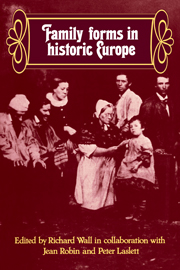Book contents
- Frontmatter
- Contents
- List of contributors
- Preface
- 1 Introduction
- 2 Two kinds of pre-industrial household formation system
- 3 ‘A large family: the peasant's greatest wealth’: serf households in Mishino, Russia, 1814–1858
- 4 The peasant family as an economic unit in the Polish feudal economy of the eighteenth century
- 5 The familial contexts of early childhood in Baltic serf society
- 6 Estonian households in the seventeenth and eighteenth centuries
- 7 Family and familia in early-medieval Bavaria
- 8 The property and kin relationships of retired farmers in northern and central Europe
- 9 Pre-industrial household structure in Hungary
- 10 The reconstruction of the family life course: theoretical problems and empirical results
- 11 The changing household: Austrian household structure from the seventeenth to the early twentieth century
- 12 Does owning real property influence the form of the household? An example from rural West Flanders
- 13 The evolving household: the case of Lampernisse, West Flanders
- 14 The composition of households in a population of 6 men to 10 women: south-east Bruges in 1814
- 15 The importance of women in an urban environment: the example of the Rheims household at the beginning of the Industrial Revolution
- 16 The household: demographic and economic change in England, 1650–1970
- 17 Family and household as work group and kin group: areas of traditional Europe compared
- References
- Index
7 - Family and familia in early-medieval Bavaria
Published online by Cambridge University Press: 05 November 2011
- Frontmatter
- Contents
- List of contributors
- Preface
- 1 Introduction
- 2 Two kinds of pre-industrial household formation system
- 3 ‘A large family: the peasant's greatest wealth’: serf households in Mishino, Russia, 1814–1858
- 4 The peasant family as an economic unit in the Polish feudal economy of the eighteenth century
- 5 The familial contexts of early childhood in Baltic serf society
- 6 Estonian households in the seventeenth and eighteenth centuries
- 7 Family and familia in early-medieval Bavaria
- 8 The property and kin relationships of retired farmers in northern and central Europe
- 9 Pre-industrial household structure in Hungary
- 10 The reconstruction of the family life course: theoretical problems and empirical results
- 11 The changing household: Austrian household structure from the seventeenth to the early twentieth century
- 12 Does owning real property influence the form of the household? An example from rural West Flanders
- 13 The evolving household: the case of Lampernisse, West Flanders
- 14 The composition of households in a population of 6 men to 10 women: south-east Bruges in 1814
- 15 The importance of women in an urban environment: the example of the Rheims household at the beginning of the Industrial Revolution
- 16 The household: demographic and economic change in England, 1650–1970
- 17 Family and household as work group and kin group: areas of traditional Europe compared
- References
- Index
Summary
Introduction
In the late autumn of 820 the Frankish Empire stood at the beginning of a difficult short-term climatic cycle and hence, for an agrarian society, a possible crisis of subsistence. According to the semi-official Frankish Royal Annals, the entire year 820, which began for the Franks at Christmas (i.e. Christmas 819–Christmas 820), had been cool and wet, leading to crop failures. This was accompanied by epidemic disease amongst both men and cattle. Flooding prevented the sowing of winter corn in many places, and these misfortunes were compounded by a ferocious winter in 821, during which many major rivers, including the Danube, froze over. The following year, 822, seems to have been without a major catastrophe of its own, although the situation could not have been good owing to the reduced harvest of winter corn in 821. In 823 again the annals of the great Bavarian cathedral monastery of St Emmeram in Regensburg report an exceptionally hard winter, followed by widespread drought and starvation, to which the Frankish Royal Annals add crop-destroying hailstorms and epidemic disease throughout the Empire.
On the first Sunday in Advent, 2 December 820, before the full effects of these calamities could have been felt amongst the rural communities of the Empire, an event occurred which allows us to describe and to analyse a group of settlements in the south-eastern frontier province of Bavaria, far away from the relatively well-mapped west Frankish heartlands.
- Type
- Chapter
- Information
- Family Forms in Historic Europe , pp. 217 - 248Publisher: Cambridge University PressPrint publication year: 1983
- 8
- Cited by



